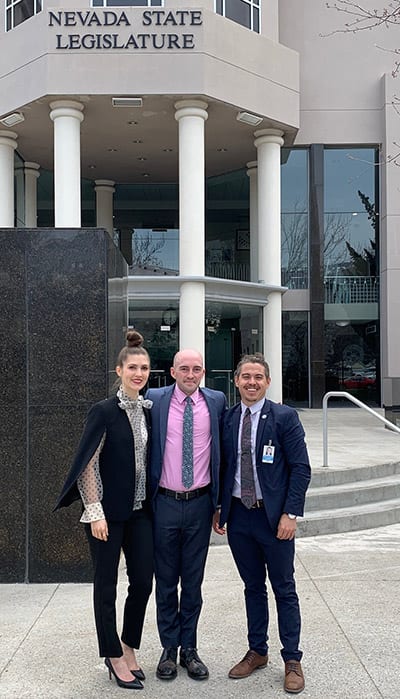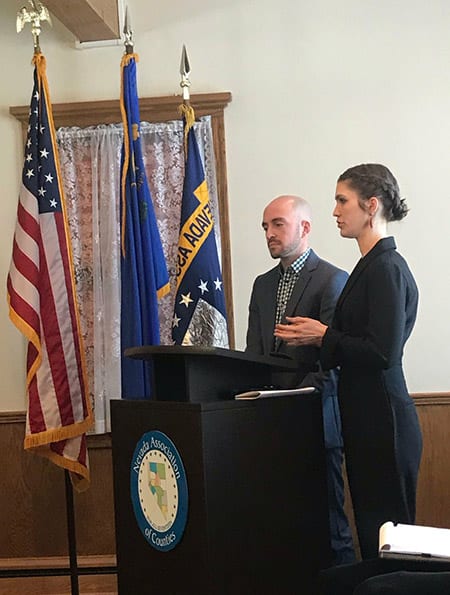By Sarah Weld

Starting July 1, Nevada families will no longer have to pay thousands of dollars for everything from food to a public defender when they have a child in the juvenile delinquency system, thanks to the initiative of two Berkeley Law students in the Policy Advocacy Clinic.
Earlier this month, Nevada Governor Steve Sisolak signed Assembly Bill 439—after unanimous passage by both houses of the State Legislature—ending the damaging and costly practice of charging fees to parents and guardians for almost every aspect of their children’s involvement in the juvenile system.
The clinic’s extensive research in states and counties across the country shows the fees disproportionately harm poor families and families of color, and that collecting them is not cost-effective. Nevada is just the second state to repeal the fees, after California.
All involved agree that none of this would have happened without Savannah Reid ’20 and Dagen Downard ’20—who both hail from Nevada.
“I don’t feel comfortable taking credit for the passage of this bill. This was the work of Savannah and Dagen in particular,” says Denise Tanata, executive director of the Children’s Advocacy Alliance, a Nevada nonprofit that partnered with the clinic throughout the process. “The whole team was amazing. I guarantee that this bill would not have gone forward without the work of the clinic and the work the students did.”
Clinic Supervising Attorney Stephanie Campos-Bui ’14, who supervised Reid and Downard’s work, concurs. “I cannot imagine this bill happening without Dagen and Savannah,” she says. “It’s very rare for students in law school to be so instrumental in making a new law that impacts so many people. They identified the problem, consulted widely with key people in Nevada, and wrote that bill from start to finish.”
Close to home
When Reid joined the clinic in the fall 2018 semester, the Las Vegas native asked if it had explored working to end these fees in her home state. Clinic Director Jeff Selbin and Campos-Bui—whose research and advocacy helped repeal juvenile fees in California in 2017—encouraged Reid to dig into the current laws, gather data about existing practices, and interview Nevada youth justice groups, juvenile public defenders, judges, and probation officers.
In Reid’s initial research, she found that the fees were pervasive, harmful, and generated little net revenue. Most people she spoke with supported eliminating the fees—and encouraged her to reach out to legislators about the prospects for a bill. She recruited fellow Nevadan Downard and the pair embarked on a whirlwind of phone calls, research, and multiple trips to Nevada, culminating in writing the bill the governor just signed.
“Being able to testify in front of the legislature as a law student will forever be one of the highlights of my law school career,” says Reid.

She and Downard agree that being from Nevada opened many doors for them as they sought meetings with important stakeholders statewide.
“I grew up in a rural mining town. Never in a million years did I think I’d work on legislation to reform my home state’s juvenile delinquency system,” says Downard, who is from Battle Mountain (population 3,635) in northern Nevada. “Growing up I didn’t have a lot of opportunities to speak in public. That was terrifying but the more I did it, the easier it got.”
Real-world experience
The students say they gained valuable skills such as public speaking, legal writing and research, drafting legislation, quickly adapting to changing situations, and learning how to talk to people with different views.
The Nevada bill is a significant win for the clinic, which is working with local partners in multiple states as part of its #DebtFreeJustice campaign with Juvenile Law Center to abolish juvenile fees nationwide.
Studies by local and state governments and the clinic consistently show that such fees fall hardest on low-income families and families of color. According to Nevada’s Division of Child & Family Services, in 2017 black youth in the state were three times more likely than white youth to be arrested and placed in county detention and six times more likely to be placed in state confinement.
Typical fees include hourly rates for a public defender, as much as $30 a day for food, clothing, and medical care, and $30 to $200 a month for supervision while on probation.
“The number of families who were going into debt to pay for these issues was just ridiculous, as was the cost of trying to recover that money. This reform is also a cost savings for the government,” Tanata says. “This is a reminder that the juvenile justice system is not about punishment, it’s really about rehabilitation. To lift this burden off the family allows them to better focus on supporting the needs of not only the youth, but also the family.”